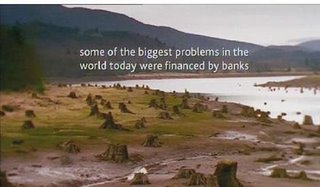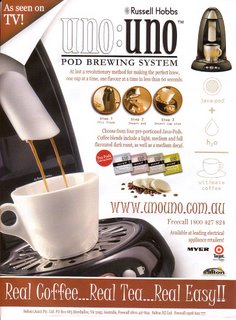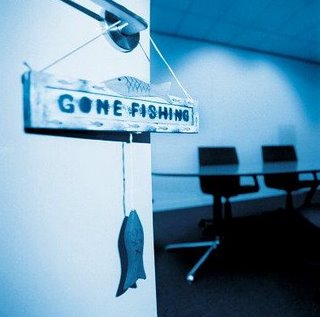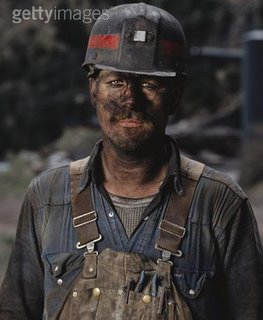Having spent time on both the agency and client side, it's pretty safe to assume that many agency people feel they've been knocked about one too many times by dumb clients who don't understand advertising.
Apparently clients are stupid. They never go for the creative idea. They advertise by formula.
You can always tell when an adman feels this way. Well intentioned advice gets handed out wrapped in acid.
In Australia, we have a monthly magazine called
Marketing. It's the pre-eminent mag for marketers in the country and features a range of articles written by guests and regulars. One of these regulars is a guy called Geoffrey McDonald Bowll from a Melbourne
ad agency.
These articles are described on the agency website as 'funny, informative articles - it will give you a good insight into how our agency thinks and it may help you make your decision'.
In the August edition of Marketing, Geoffrey talks about TV creative. He moans about clients wanting formula ads. And sending the assistant brand manager down to the edit suite making adjustments when they're clearly not qualified to do it. And how consumers sooooo recognise formula ads and laugh at the companies. Apparently.
By the way, the reason clients go to edit suites is so that the brand doesn't end up as big as something like this..
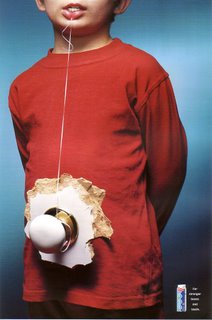
Don't get me wrong. I agree with the a lot (not all) of what Geoffrey has to say. A lot of his articles have some fantastic insights and viewpoints. But when I have a message delivered to me in a way which suggests I'm a stupid moron, so I better sit back in my corner whilst I get told how it's really done, I ain't gonna feel real positive towards the brand am I?
I assume this is not how Geoffrey's agency approaches making a TV ad. Let's tell mum she's a dickhead for not buying Omo. It's about the best clean, stupid! Can't you see that?
So why would you address the marketing community this way? Perhaps it's time to stop writing articles telling marketers 'you don't get it so leave it to the experts', and devoting some time to addressing the situation.
Because, yes, many clients don't understand the role of creativity, as I tried to
explain yesterday.
I really like the way
Leo Burnett in Toronto talks about the issues they face every day. I think I'd like to work with them.
But for now, I'd like to respond to a couple of comments raised in the above-mentioned article, because there's always two sides to a story, and it got under my skin a bit.
____________________________________________
Why make good, creative ads?"Because a good ad or two will make your career for years, if not decades. Because you'll be able to say at the bar, or to your mum, "Yeah, that's one of my ads". More importantly, I hope, I care because I think we ought to make ads the public wants to see."The fundamental difference between agencies and clients is that in agency-land, creative ads are stepping stones to bigger, higher paying jobs. In client-land, being able to show you've grown a brand by x% and delivered record profit results will usually excite potential employers.
So nice ads are one thing. But they're a means to an end. And the end is selling lots of product.
So making a nice or creative ad isn't something us marketers sit there and get all excited about. It's what that ad will do for our business that get's us turned on.
_____________________________________________
I buy into the power of creativity. I've only been told once in my career why creativity is so important, beyond the usual 'cut-through, attention grabbing' stuff. And that was three days ago when I actively searched it out on the net. And the answer I got was this one from
Adliterate.....
Why are creative ideas a good idea?"Creative ideas transfer meaning. Or to be more precise, creative ideas allow the consumer to transfer meaning since the idea itself is quite passive." It's an excellent piece.
Additionally, there's plenty of other stuff around. In the book
Waking The Giant by Peter Steidl and Kim Boehm, they talk about how because brands are memories, how do we increase the likelihood of our message being:
a) stored in the memory
b) linked closely to the brand
c) activated frequently
It then goes on to explain why ads which cut through, which emotionally engage, which are new and unexpected, which are of a multi-sensory nature etc, are the ads marketers should be striving to produce.
When's the last time your agency sat down and explained to the marketing team this kind of stuff?
I reckon a lot of marketers would be interested in hearing this. Especially from their ad agencies who live by the credo "Creativity is King'.
____________________________________________
Breaking the Mould"You have to do new, rather than a re-hash of old ideas. The more unusual it is, the better it will work? I've seen clients (not ours) who want to know who else in their market has had success with this approach? This is the gutless 'we don't want to make a mistake' approach that guarantees disaster".So the more unusual it is, the better it will work. Just like A Current Affair trots out the same stories night after night, and has been doing so for 20 years, and is one of the most watched shows in the country.
Being unusual does not necessarily mean being creative. The red meat campaign Geoffrey talks about is a creative and good ad, I agree. But it's not unusual.
This is unusual. And buggered if I know what they're trying to say about Westfield Bondi Junction, the best shopping complex in Australia...

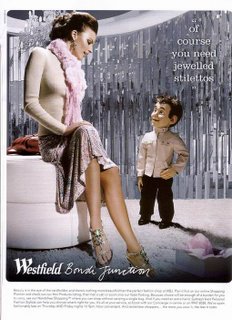
As for the comment about about gutless clients asking who else in the category has had success with unusual ideas, if my Brand Manager didn't ask this question of his agency I would be flabbergasted and a bit pissed.
Isn't it the agency's job to help the client understand what kind of advertising works best in their category? Agencies are the experts. You tell us. Marketers don't spend 100% of their time living and breathing advertising. It's maybe 20%. They're busy being General Managers for their brands and acting as the hub across 30 internal and external functions, and putting out stupid fires. They are jack of all trades.
So as an agency and an expert in advertising, you tell us what's working and what's not and why.
____________________________________________
Are Funny Ads Better?"Funny always wins over anything else. Do you email your mates serious ads?"I have never heard any proof that funny ads are more effective than ads that are not funny. I just keep hearing the line from agencies that "funny ads work better".
Deliver me a meaningful insight about the target audience that shows why a funny ad will resonate better with them and work better in the context of solving my brand problem, then I'm all ears.
Just don't keep beating me over the head with stuff like this and then make out I'm an idiot for not buying into it.
____________________________________________________________
What You Should Do if You're a Marketing Manager"An agency will show a brilliant idea to a brilliant client scribbled on a table napkin. Because that's all an intelligent person will need to see the idea. For a dummy, or people they assume to 'visual cripples', they'll get a storyboard drawn up, illustrated in pretty colours etc"In other words, trust the agency with their idea, even if you are struggling to understand it or it's merits, before you move ahead.
OK, so a client is about to spend $4 million on a campaign, and another $350k on production, and bucketloads of hours, but they should feel alright about this because it's a brilliant idea even it was drawn on napkin. And you're an idiot of you don't get it straight away.
Wow, if I was a marketer I'd be ditching my current agency so I could work with this kind of rigour and attitude.
People think in different ways.
Men and women might be a nice example to begin with. The skill level of marketers when it comes to conceptualising new ideas also differs. Live with it and help them through it. But don't call them cripples. Then they might start conceptualising a new agency.
_____________________________________________
At the shoot"Yours is not a role that can tell others anything. You're only allowed to watch and, if you're lucky, you can speak with the agency suit"This must be the 'funny, informative' bit. How dare a client have a point of view. The shoot must be sacred ground.
I've been at shoots where the person has been consuming the product with his hands all over the brand and no-one said anything.
I've been at shoots where a decision about something unexpected came up and I had a different view to the suit about how it should be handled. Surely that's a discussion that needs to be worked through as a team.
I've been at shoots where they've used background products from the competitive company!
I'd heard many similar stories from marketers through the years.
I always try and work with a director who understands he's making an ad (not a film) with my money, and has a vested interest in having a happy client. This is an important part of the selection process.
Of course you stay out of their way as much as you can on shoot days (I've not encountered a situation otherwise). But if something looks out of place then the client has every right to say something. Tactfully and responsibly.
OK, I've got that off my chest now.
For my next entry I think I'll throw a few ideas forward about how to bridge the gap between the different expectations on the agency versus client side.
